ナチスのホロコーストを学ぶためのおすすめ参考書一覧
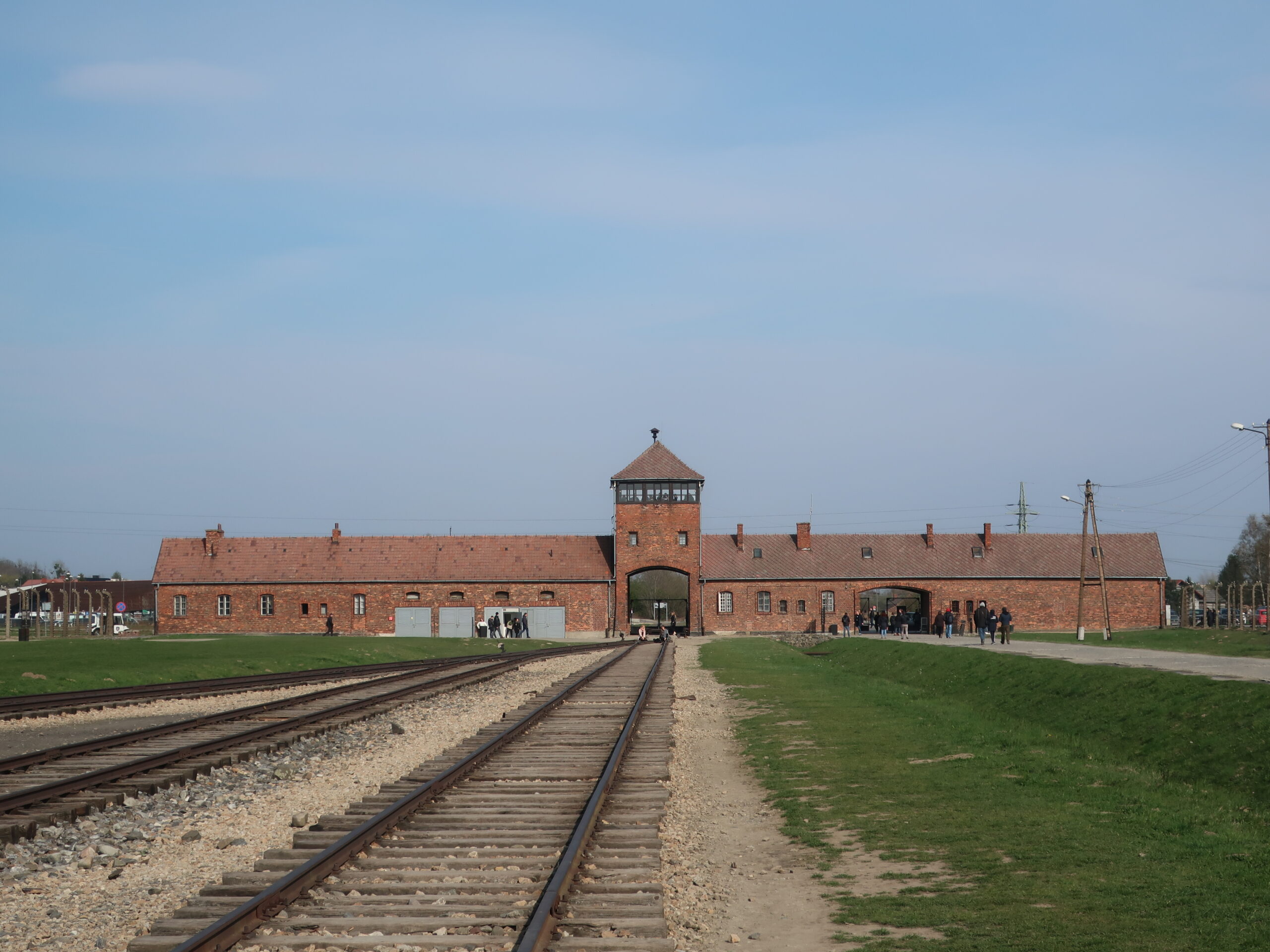
ナチスのホロコーストを学ぶためのおすすめ参考書一覧
この記事ではこれまで当ブログで紹介してきたホロコーストの歴史を学ぶ上で参考になる本をご紹介していきます。
それぞれのリンク先ではより詳しくその本についてお話ししていきますのでぜひそちらもご覧ください。皆さんのお役に立てましたら幸いでございます。
ワシーリー・グロスマン『トレブリンカの地獄』

この作品はソ連のユダヤ人作家グロスマンが従軍記者として独ソ戦の前線に従軍し、ナチスの絶滅収容所を発見した際に書かれた報道記事です。
ホロコーストというと、私たちはアウシュヴィッツを想像してしまいますが、トレブリンカという絶滅収容所についてこの作品では語られていきます。そこでは80万人以上の人が殺害されています。その凄惨な殺害の手法は読んでいて寒気がするほどです。それを現地で取材したグロースマンはどれほど衝撃を受けたのか想像することもできません。
この作品を書いたグロスマン本人もこの惨劇に打ちひしがれていたのでした。彼もユダヤ人です。彼の母もナチスによって殺されています。
目を反らしたくなりそうな現実をそれでもグロスマンは書き続けました。
その迫力は鬼気迫るものがあります。読んでいてあまりの恐ろしさに心臓の鼓動が早まり、呼吸が浅くなっていくのが自分でもわかりました。この本を読む時の精神的負荷はかなりのものになります。私はこの作品はフランクルの『夜と霧』に匹敵するのではないかと思いました。それほどこの作品が発する力は強力です。
ワシーリー・グロスマン『トレブリンカの地獄』ナチスの絶滅収容所の惨劇を赤軍ユダヤ人記者が告発
Amazon商品ページはこちら↓
フランクル『夜と霧』
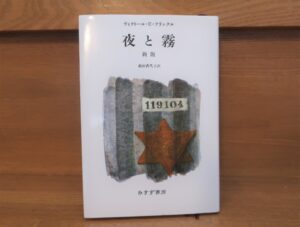
- この記事の目次
- 1.1 人間はなにごとにも慣れる存在だードストエフスキー『死の家の記録』の言葉から
1.2 「わたしが恐れるのはただひとつ、わたしがわたしの苦悩に値しない人間になることだ」
1.3 「なぜ生きるかを知っている者は、どのように生きることにも耐える」
1.4 わたしたちが生きることからなにを期待するかではなく、むしろひたすら、生きることがわたしたちからなにを期待しているかが問題なのだ
1.5 苦しむことは何かをなしとげること
1.6 あなたを待っている何かがある
1.7 『それでも人生にイエスと言う』春秋社、山田邦男、松田美佳訳
1.8 『人間とは何か 実存的精神療法』 春秋社、山田邦男監訳、岡本哲雄、雨宮徹、今井伸和訳
- 1.1 人間はなにごとにも慣れる存在だードストエフスキー『死の家の記録』の言葉から
この作品は心理学者フランクルがアウシュヴィッツやミュンヘンのダッハウ収容所での経験を綴ったものです。
ひとつ前の記事でご紹介したワシーリー・グロスマンの『トレブリンカ収容所の地獄』が絶滅収容所の悲惨さを描いたのに対し、『夜と霧』では強制収容所という極限状態においてどのように生き抜いたのか、そしてそこでなされた人間分析について語られていきます。
『夜と霧』は世界的に知られた名著中の名著です。私がこの本を初めて読んだのは学生の時でした。その時の衝撃は今も忘れられません。
そうした読書体験があったからこそ私は2019年にアウシュヴィッツを訪れたのでした。
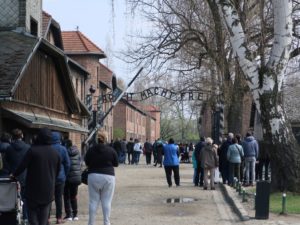
また、『夜と霧』を読んでいるとドストエフスキーの言葉が何度も出てきます。フランクルはドストエフスキーの影響を受けていたようです。この記事ではフランクルとドストエフスキーの関係についてもお話ししていきます。
フランクル『夜と霧』あらすじと感想ー生きるとは何かを問うた傑作!ドストエフスキーとのつながりも
Amazon商品ページはこちら↓
芝健介『ホロコースト』
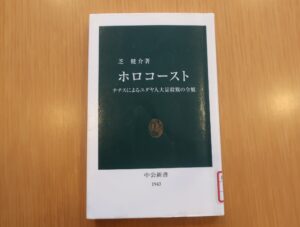
ホロコーストの歴史を学ぶ入門書としてこの本はとてもおすすめです。ホロコーストはアウシュヴィッツだけではなく、一連の巨大な虐殺事件であり、それがどのような経緯で起こったのかが非常にわかりやすく解説されています。
新書ということでコンパクトにまとまっていてとても読みやすいのもありがたいです。アウシュヴィッツやホロコーストの歴史をまずはざっくり学んでみたいという方にぜひおすすめしたい1冊です。
芝健介『ホロコースト』ホロコーストの歴史を学び始めるのにおすすめな1冊
Amazon商品ページはこちら↓
ホロコ-スト: ナチスによるユダヤ人大量殺戮の全貌 (中公新書 1943)
M・ベーレンバウム『ホロコースト全史』
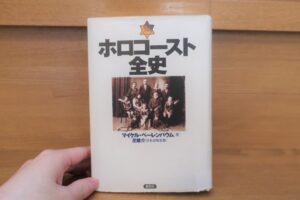
この本は時系列に沿ってホロコーストの経過を解説していくので、何かわからないことや調べたいことがあるときにもピンポイントで調べることができとても便利です。
そして何よりこの本で私の印象に残っているのは掲載されているたくさんの写真でした。
この本は写真資料が豊富です。しかもその写真がかなりショッキングなものばかりです。
ガリガリに痩せほとり、服を着ていない無数の遺体が巨大な穴の中に折り重なっている写真など、他の本ではあまり掲載されないようなものも多々あります。ホロコーストの悲惨さがストレートに伝わってきます・・・
ホロコーストについてより深く学ぶにはこの本はとてもおすすめです。資料集として利用するのにも抜群だと思います。
これはぜひおすすめしたい1冊です。
『ホロコースト全史』ホロコーストの歴史をもっと学ぶならこの一冊がおすすめ
Amazon商品ページはこちら↓
C・アングラオ『ナチスの知識人部隊』
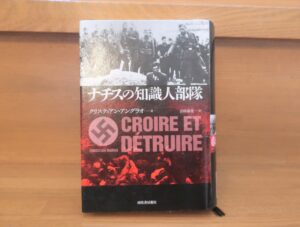
- この記事の目次
- 1.1 「彼らは美男で、輝かしく、知的で、教養があった」
1.2 ドイツ人が抱えた第一次世界大戦敗北のトラウマ
1.3 なぜ青年たちはナチスに熱狂したのか
1.4 ナチス兵も虐殺執行による精神的ダメージを受けていたという事実。しかしそれが虐殺の効率化をさらに進めることに・・・
1.5 ジェノサイドは私達に無縁のものではない
1.6 ナチスの行動は「狂気」ではなく「普通の人間」によるものだった
1.7 信じることと、皆殺しにすること
- 1.1 「彼らは美男で、輝かしく、知的で、教養があった」
この本はナチスにおいて大きな役割を果たしていた青年知識人にスポットを当てて書かれた本です。
そしてこの知識人部隊は若いエリートが多かったというのも重要です。ナチスのイデオロギーは若い知的エリートによって作られていったのです。老獪な政治家たちが練りに練って作ったイデオロギーではなかったのです。
この本ではそんなナチスの若き知的エリートがどのように生まれ、彼らが独ソ戦においてどのような行動をしていったのかが語られます。
『ナチスの知識人部隊』虐殺を肯定する理論ーなぜ高学歴のインテリがナチスにとって重要だったのか
Amazon商品ページはこちら↓
ティモシー・スナイダー『ブラッドランド ヒトラーとスターリン 大虐殺の真実』
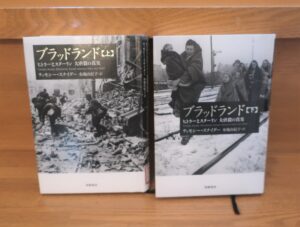
この本はスターリンとヒトラーの大量虐殺について書かれたものです。
しかもこれまで語られてこなかった事実がこの本で明るみに出されます。これは以前当ブログでも紹介した『スターリン伝』と同じく、新たな資料がソ連崩壊によって次々と発見されてきているからです。
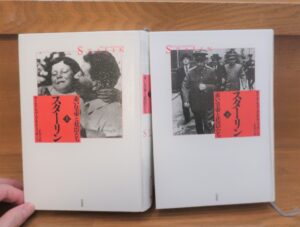
そして何より、この本はナチスによるホロコーストについても多くの言及があります。
上でも申しましたが、私は2019年にアウシュヴィッツを訪れました。人類の犯した悲惨な過去を学ぼうと思ったからです。
しかしです。この本を読んで自分がいかに何も知らないのかということを思い知らされることになりました。
それはこの本を読んでいく過程で皆さんにも明らかになっていくと思います。アウシュヴィッツに対する見方が変わってしまうほど衝撃的な事実がそこにはありました。
訳者が「読むのはつらい」と言いたくなるほどこの本には衝撃的なことが書かれています。しかし、だからこそ歴史を学ぶためにもこの本を読む必要があるのではないかと思います。
そもそもこの本を読むきっかけとなったのはスターリンの大テロル(粛清)と第二次世界大戦における独ソ戦に興味を持ったからでした。
スターリンはなぜ自国民を大量に餓死させ、あるいは銃殺したのか。なぜ同じソビエト人なのに人間を人間と思わないような残虐な方法で殺すことができたのかということが私にとって非常に大きな謎でした。
その疑問に対してこの上ない回答をしてくれたのがこの『ブラッドランド ヒトラーとスターリン 大虐殺の真実』でした。
この本は大量殺戮の歴史について学ぶ上で非常に大きな意味がある作品です。ぜひおすすめしたい作品です。
衝撃の一冊!ティモシー・スナイダー『ブラッドランド ヒトラーとスターリン 大虐殺の真実』
Amazon商品ページはこちら↓
ブラッドランド 上 ――ヒトラーとスターリン 大虐殺の真実 (ちくま学芸文庫 ス-29-1)
アーレント『エルサレムのアイヒマン 悪の陳腐さについての報告』
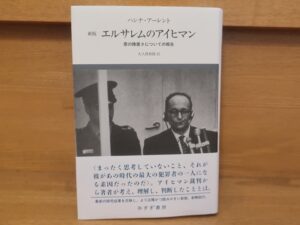
この本はアーレントの有名な「悪の陳腐さ」という言葉が生まれた作品になります。
アーレントはこの作品でナチスのホロコーストにおける恐るべき殺人システムの背景を考察します。
ホロコーストの責任者の一人であるアイヒマンは極悪人であるはずだ。そうでなければあんなことはできるはずはない。
世界中の誰しもがそう思っていました。
しかしアーレントはそれを覆す「悪の陳腐さ」という概念を提唱することになります。ここに世界中の人たちの衝撃があったのでした。
「命令だから」「義務だから」「服従せねば自分が危険だから仕方なくやった」
もしすべての人がそう言ったら一体誰を裁けばいいのだろうか。そうした問題がここで浮上してきます。
アイヒマンの悪の陳腐さはこうした難しさをはらむため、世界中で激しい議論を呼ぶことになりました。
ホロコーストをどのように考えていくかという問題の大きな手掛かりとなる一冊です。
悪の陳腐さとは~アーレント『エルサレムのアイヒマン 悪の陳腐さについての報告』
Amazon商品ページはこちら↓
B・シュタングネト『エルサレム〈以前〉のアイヒマン 大量殺戮者の平穏な生活』
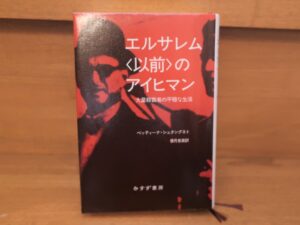
この本ではアイヒマンは「悪の陳腐さ」とは真逆の人間だったという驚きの事実が明かされます。あまりに衝撃的。この記事であらすじだけでも見て頂けると幸いです。
「アイヒマンは悪の化身のような人物ではなく、どこにでもいそうな普通の人間だった。官僚システムの中の単なる歯車の一つに過ぎず、命令に盲目的に従うだけの陳腐な人間に過ぎなかった。そんな人間が大量虐殺を犯していたのだ。」というのがアーレントの論です。
しかしです。この『エルサレム〈以前〉のアイヒマン』ではそんなアーレントの理論が覆されかねない衝撃的な事実が語られます。 というのも、この本では近年研究が進んできた資料によってモサドに逮捕される前のナチス時代、そしてドイツ、アルゼンチンでの逃亡期間のアイヒマンの言動が語られます。
つまり、文字通り「エルサレムでのアイヒマン裁判」以前のアイヒマンの姿が語られることになります。 そしてそこで明らかにされるアイヒマンは「悪の陳腐さ」とは真逆の姿でした。アイヒマンは単なる権力の歯車などではなかったのです。
アーレントの「悪の陳腐さ」という言葉はあまりに有名です。 「誰もが悪をしうるのだ」という概念そのものは私も同意しますし、このことを世界中に発信した意義はとてつもなく大きなものだったと思います。 ですが、その理論が生まれるきっかけとなったアイヒマンが「悪の陳腐さ」とは真逆の人間だった。
アイヒマンから生まれた理論はアイヒマンには適用できない。 だが人間全体としては「悪の陳腐さ」はいつどこで誰にでも起こりうる理論である。 こうした何とも矛盾した問題を私達は突きつけられることになります。
あまりに衝撃的な一冊!非常におすすめです!
「悪の陳腐さ(凡庸さ)」論が覆る!?『エルサレム〈以前〉のアイヒマン 大量殺戮者の平穏な生活』
Amazon商品ページはこちら↓
仲正昌樹『悪と全体主義 ハンナ・アーレントから考える』
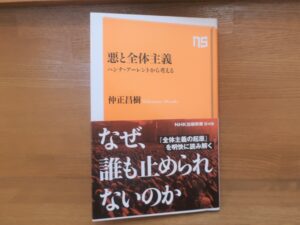
上で紹介した『エルサレム〈以前〉のアイヒマン』は大作ではあるものの文章自体は読みやすく、すらすら読めるのですが、残念ながらアーレントの作品はとてつもなく読みにくいです。
そんなアーレントの作品をまずはざっくりと理解するのにいい参考書はないかと探していたところ出会ったのが、ここで紹介する『悪と全体主義 ハンナ・アーレントから考える』 です。
この本ではアーレントの代表作『全体主義の起源』と『エルサレムのアイヒマン』を中心にアーレントの生い立ちや哲学者としての道のり、思想が解説されていきます。
読んでいて驚くほどわかりやすいです。初学者でも理解しやすいように書かれていることがとても伝わってきます。
そしてこの本ではなぜアーレントの思想が今を生きる私達にとって重要なのかということを丁寧に語ってくれます。
ここがはっきりしないとなかなか本を読む気にも、学ぼうという気持ちにはなりませんよね。
「なぜ」が明確になると読む意義がはっきりして、気持ちも変わってきますよね。こうした点もこの本のありがたい所です。
ハンナ・アーレントは有名ではありますが実際にその作品を手に取る機会が少ない思想家の代表例なのではないかと思います。
この本はそんなアーレントの思想を学ぶ入門書として非常にありがたい1冊だと思います。
ぜひ、おすすめしたい作品です。
アーレントのおすすめ参考書!仲正昌樹『悪と全体主義 ハンナ・アーレントから考える』
Amazon商品ページはこちら↓
悪と全体主義 ハンナ・アーレントから考える (NHK出版新書)
おわりに
ホロコーストは他人事ではありません。
アーレントが「悪の陳腐さ」という概念で表したように、一度歯車になってしまったら誰しもが加害者になりうるのです。当然、私も例外ではありません。ある特定の状況に置かれたら人は何にでもなりうるということをホロコースト、独ソ戦から私は強く感じたのでした。
悲惨な歴史をくり返さないためにも、なぜそれは起こってしまったのか、なぜ誰も止められなかったのかというメカニズムを学ぶことが重要です。
ただ単に「平和は大事」「殺人はよくない」で済む問題ではありません。そう思っていてもなお戦争をしてしまうのが人間の悲しい現実です。
だからこそそういう状況になる前に世の中の流れに気づき、その流れを止めなければなりません。
歴史を学ぶというのはそういうことだと私は思います。この記事がそのための一助になりましたら幸いです。
以上、「ナチスのホロコーストを学ぶためのおすすめ参考書一覧」でした。
関連記事
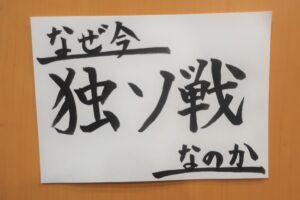

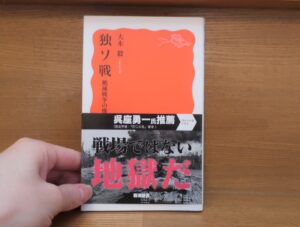

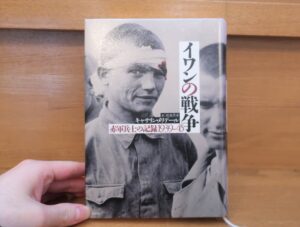










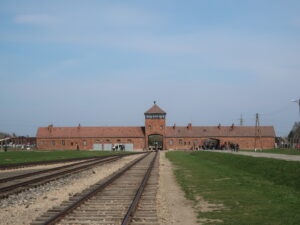
コメント